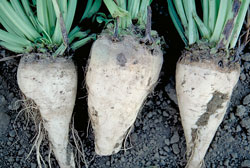North Dakota State University has partnered up with a couple of private sector companies to develop energy beets for advanced ethanol production.
 The partnership includes Green Vision Group (GVG) of Fargo and Heartland Renewable Energy of Iowa in the project that is fueled by a $1 million, two-year North Dakota Renewable Energy Council grant that includes matching funds from industry partners Betaseed and Syngenta.
The partnership includes Green Vision Group (GVG) of Fargo and Heartland Renewable Energy of Iowa in the project that is fueled by a $1 million, two-year North Dakota Renewable Energy Council grant that includes matching funds from industry partners Betaseed and Syngenta.
In 2010, GVG and HRE formally came together to form BeetsAll Biofuel, a partnership that envisions developing at least 12 sustainable ethanol facilities across North Dakota, according to Maynard Helgaas, president of GVG. “Each plant will use energy beets grown within a 20-mile radius and support job creation in rural communities,” said Helgas. “This grant will help us make significant progress toward that vision and help develop North Dakota’s energy beet biofuel industry.” GVG is in the process of selecting the location for its first processing facility, which is expected to produce 20 million gallons of ethanol per year once complete.
Cole Gustafson, NDSU Department of Agribusiness and Applied Economics chair, says they believe ethanol produced from sugar beets can be sold at a premium, which will benefit both farmers and producers. “We expect that energy beet ethanol will produce 50 to 60 percent less greenhouse gas emissions than petroleum-based fuels, which will designate it as an advanced biofuel. We are working to finalize the life-cycle analysis of energy beets through a formal Environmental Protection Agency application. Securing EPA approval of energy beets as an advanced biofuel will mean a significant premium for producers and processors in the sugar-based ethanol market.”
The project seeks to establish a U.S. Department of Agriculture Risk Management Agency multiperil crop insurance program for energy beets; engineer and evaluate new front-end energy beet processing methods; expand regional energy beet research trials; scale up whole-energy beet and juice storage technology to enable year-round processing; and inform producers, community developers and the biofuel industry of the emerging opportunity.

